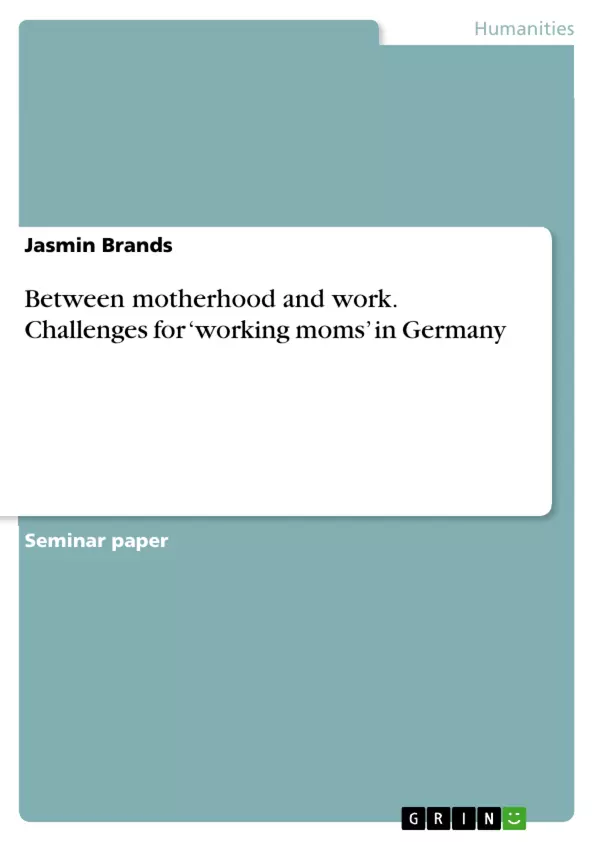Nowadays, most women want both – being a mother and pursuing a career - as the “Monitor Familienforschung” by the Bundesministerium für Familie, Senioren, Frauen und Jugend reports. A panel survey headed by Jutta Allmendinger shows that only 10 percent of the interviewed women would give up having children for their job and only 29 percent could imagine giving up on work for their children (Allmendinger, 2009, figures 8 and 9). Nevertheless, reality is not completely in compliance with these wishes and that is a challenge for family policy (Bundesministerium für Familie, Senioren, Frauen und Jugend, Monitor 3). Recent debates about the establishment of a female quota on executive boards, the childcare supplement or the legal entitlement to day-care for children under the age of three show how important female employment and the reconciliation of family and working life have become on a political level (e.g. Merkel, 2013). Nevertheless traditional role models still influence the thinking of many people in Germany and mothers who work (more than part-time) are often called “uncaring” (Luci, 2011, p. 11).
The aim of this paper is to work out which challenges working mothers have to face these days. To provide a better understanding of the development of women’s role in Germany an overview about how it was defined in the past and in the present shall be given in the first part of this analysis. Following this overview, a closer look at the numbers of female employment will be taken to find out which employment relationships are relevant for women in general and for mothers in particular. Afterwards the challenges working mothers have to face due to role assignments and/or in connection with employment relationships will be portrayed. These findings will be summarised and needs for actions identified in the conclusion. It should be noted that this analysis only presents an overview and therefore, does not purport to be complete.
Inhaltsverzeichnis (Table of Contents)
- Introduction
- The role of women - then and now
- Common forms of work for women
- Challenges for 'Working moms'
- Conclusion
Zielsetzung und Themenschwerpunkte (Objectives and Key Themes)
The primary aim of this paper is to analyze the challenges that working mothers face in contemporary Germany. It explores the historical and current perspectives on women's roles in society, examines the various employment patterns prevalent among women, and focuses on the specific difficulties encountered by "working moms".
- The evolving role of women in German society
- The prevalence and types of employment among women, particularly mothers
- The challenges faced by working mothers due to societal expectations and employment conditions
- The impact of traditional gender roles on the perception of working mothers
- The need for policy initiatives to support the reconciliation of work and family life
Zusammenfassung der Kapitel (Chapter Summaries)
- Introduction: This chapter introduces the topic of working mothers in Germany, highlighting the increasing desire of women to balance motherhood and careers. It also discusses the societal and political context surrounding this topic.
- The role of women - then and now: This chapter traces the historical evolution of women's roles in Germany, outlining the traditional family model and the societal expectations placed upon women. It also describes the significant changes that have occurred, including women's access to education and the rise of women's rights movements.
- Common forms of work for women: This chapter analyzes the patterns of female employment in Germany, presenting data on the overall employment and activity rates of women. It also examines the different types of employment relationships, including full-time, part-time, and self-employment, and their prevalence among women.
- Challenges for ‘Working moms': This chapter delves into the specific challenges faced by working mothers in Germany. It explores the societal attitudes and perceptions that often influence the treatment of working mothers, as well as the difficulties they encounter in balancing work and family responsibilities.
Schlüsselwörter (Keywords)
The key concepts explored in this paper include women's roles, gender equality, female employment, work-life balance, working mothers, family policy, traditional gender roles, and reconciliation of work and family life.
Frequently Asked Questions
What are the main challenges for working mothers in Germany?
Challenges include balancing career and family life, overcoming traditional role models, and dealing with social perceptions like the "uncaring mother" label for full-time working moms.
How many women in Germany would give up their job for children?
According to a survey by Jutta Allmendinger, only 29 percent of women could imagine giving up work entirely for their children, showing a strong desire for both motherhood and a career.
What is the "childcare supplement" and its role in policy?
It is a political instrument discussed in the context of family policy, alongside the legal entitlement to day-care, aimed at supporting parents in managing work and childcare.
How have traditional gender roles evolved in Germany?
While women have gained better access to education and the workforce, traditional views still persist, often making it difficult for mothers to work more than part-time without facing social judgment.
Why is the reconciliation of family and work a political priority?
It is essential for economic stability and gender equality. Discussions about female quotas on executive boards highlight the need for structural changes to support working mothers.
- Citar trabajo
- Jasmin Brands (Autor), 2013, Between motherhood and work. Challenges for ‘working moms’ in Germany, Múnich, GRIN Verlag, https://www.grin.com/document/278185



